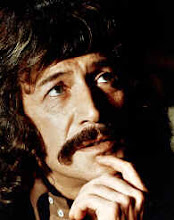Considering it was written a decade ago, and is set 40 years ago, Michael Frayn's Democracy feels like it could have been penned last week. As well as the piece of dialogue that heads this review, there are a number of knowing chuckles to be had in lines such as 'that leaking tub of a party sinking towards oblivion... the Liberals, even the name turns my stomach!'
Of course, we aren't talking about Britain in the 2010s but West Germany 1969-1974, during the Chancellorship of Willy Brandt, the first left-winger to hold the office since the pre-Nazi era. Brandt is authoratively played by Patrick Drury but the real protagonist is Aidan McArdle as Gunther Guillaume, a self-effacing 'nobody' who rises through the party ranks to become Brandt's trusted personal assistant despite being all the while a covert East German agent.
The play starts a little awkwardly with some heavy-handed info-dumping for those not au fait with post-war German politics and the introductions of a number of characters little known even to political junkies like myself. Guillaume's side of stage conversations with his East German handler don't work quite as well as they could, but both he and Brandt are sympathetic, if flawed, characters and the story of their growing friendship - and Brandt's eventual downfall because of it - becomes genuinely absorbing, and a very solid ensemble cast gives life to the crowd of devious political operators that surround the Chancellor.
Brandt is the kind of politician you don't see any more - imperfect as a man of course, but capable of inspiring great devotion from the public and with a charisma and sureness of purpose that our current crop of politicos can't come close to matching. His replacement at the end of the play with the bland technocrat Helmut Schmidt can't help but look like a early sign of things to come. Maybe we're better off without too much ideology though - as Brandt says in Democracy 'under capitalism man exploits man, under socialism it's the other way round.'
Saturday 23 June 2012
Subscribe to:
Posts (Atom)
